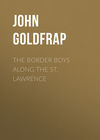Kitabı oku: «The Dreadnought Boys on Battle Practice», sayfa 6
CHAPTER XIII.
HERC LEARNS WHAT "THE BRIG" IS
In a few minutes the messenger returned with the master-at-arms, who saluted the officer of the deck, who in turn gravely saluted him. Herc, feeling that he should do something, saluted each of them in turn, concluding his respectful motions with a deep bow.
Neither officer, however, paid any more attention to the lad than if he had been carved out of wood.
"Master-at-arms!" began the officer.
"Yes, sir," responded the master-at-arms, bringing his heels together with a sharp click.
"There has been a flagrant breach of discipline here, which it is my duty to report to the captain at once. You will place this man, Ordinary Seaman Taylor, under restraint, and arraign him at the mast at one o'clock with the other prisoners."
"Yes, sir," nodded the master-at-arms, edging up to the dismayed Herc.
"Kennell, if you wish to prefer a complaint against this man Taylor, you may," went on the officer.
"I do, sir, certainly," said Kennell earnestly, through the paint that smothered his face; "but first, sir, I should like to clean this mess off, sir."
"You will be relieved from duty while you do. Carry on, men."
The officer of the deck faced about and walked aft; no doubt to acquaint the captain with the details of the occurrences on the forward deck.
"Come, wake up," said the master-at-arms to Herc, who was in a semi-stupor at the horrifying idea that he was under arrest. "Come with me."
"What! I'm to be locked up?" gasped Herc.
"Yes, in the brig."
In an instant the recollection of the boys' conversation with old Tom on the day they joined the ship flashed into Herc's mind. So then "the brig" that the old tar had been so reluctant to talk about, was the place in which they locked up malefactors and disgracers of the service, of whom it seemed he was one. Poor Herc felt ready to drop with shame and humiliation as – under the eyes of the hundreds of jackies going about their various tasks – he was marched aft by the master-at-arms. There was only one drop of relief in his bitter cup. It came when Ned pressed forward, at the risk of being severely reproved.
"Never mind, Herc, old fellow," he breathed. "I know you were in the right, and I'll see that Kennell gets what's coming to him, if it's the last thing I do."
"Come, sir! carry on," snapped the master-at-arms, who had pretended not to notice the first part of this conversation, being a really kind-hearted man, although bound by discipline, just as is every one else in the navy; "you must know it is a breach of discipline to talk to prisoners."
Prisoners!
Poor Herc groaned aloud.
"Come, come," comforted the master-at-arms, "it isn't as bad as all that. I am confident that you can clear yourself. Besides, it is your first offense, and you are a recruit, so perhaps the old man will be easy on you."
"It isn't that, so much as it's the disgrace of being arrested like this," burst out Herc.
"Oh, well, you shouldn't go to fighting, then," remarked the master-at-arms, pulling open a steel-studded door and thrusting Herc before him into a narrow passage, lighted by electric bulbs, down one side of which was fitted a row of steel-barred cells.
"We're a bit crowded," he remarked, "so I can't give you a cell to yourself. When a ship puts to sea out of a port there are generally a lot of men to be disciplined. Those who have overstayed their leave, and so forth. Therefore, I'll have to put you in here."
He opened a door as he spoke, and pushed Herc into a cell in which two other men were already seated on a narrow bench which ran along one side.
"You'll get a full ration at eight bells, for which you are lucky," remarked the master-at-arms; "the others get only bread and water."
Clang!
The steel door swung to, and Herc, for the first time in his life, was a prisoner.
It did not make the experience any the less bitter to know that he was a captive and disgraced through no fault of his own, unless it had been from his exuberant swinging of the paint-pot in the enthusiasm of his newly-acquired "sea-legs."
The Dreadnought Boy, despite his unpleasant situation, was naturally inquisitive enough to gaze about him on his surroundings. The cell itself was a steel-walled apartment about twelve feet square with no other furnishings than the narrow bench, which also was of steel. It was lighted by an electric bulb, set deep in the ceiling and barred off, so that it could not be tampered with by a meddlesome prisoner. The walls of this place were painted white. The floors red. It was insufferably hot and stuffy, and the songs of a group of roisterers confined in another cell, which broke forth as soon as the master-at-arms departed, did not tend to make the environment any pleasanter.
"So this is the brig," mused Herc, "well, they can have it for all I want with it. It's not much better than the hog-pen at home."
One of Herc's fellow prisoners, who had been sitting sullenly on the bench, now arose and began to pace back and forth. His companion did likewise. They had not paid the slightest attention to Herc hitherto, but now one of them spoke.
"What you in for, kid?"
"I guess you'll have to ask the master-at-arms," rejoined Herc, who was not prepossessed by his questioner's appearance. He was a heavy-set, low-browed man, with a pair of black eyebrows that almost met in the center of his forehead, giving him a sinister aspect. His companion was slight, and long-legged, with a delicate – almost an effeminate – cast of features.
"Oh, well, if you don't want to talk you don't have to," growled the heavy-browed man. "Say, Carl," he went on, turning to his companion, "this is a nice, sociable cellmate they've given us, isn't it?"
"You attend to your own affairs, Silas," snarled the other, who did not seem to be any more amiable than his heavy-browed friend; "leave the kid alone. We've got trouble enough of our own, haven't we?"
"Hum, yes; but overstaying leave isn't such a very serious matter, and think of the reward that's ahead in store for us. Only this cruise, and – "
"Hush!" broke in the one addressed as Carl, with an angry intonation; "you must be a fool to talk like that in front of the kid," he went on in a low undertone.
"Pshaw!" snarled the other in the same low voice, however. "He's just a country Reuben, with the hayseed still in his hair and the smell of the hog-pen on him – like that one we gambled with in New York – Hank Harkins – wasn't that his name? – on the old 'Idy'."
"Just the same, it's well to be prudent," counseled the other, and fell once more to his pacing of the cell.
As for Herc, to whom all this, including the reference to Hank, had been, as Carl had guessed, so much Greek, he laid down at full length on the bench. As he had not had more than a few winks of sleep during his seasick night, he soon dropped off into peaceful slumber, despite his uncomfortable couch and serious position.
How long he slept, he did not know, but he woke with a start, and was about to open his eyes, when he suddenly closed them again and feigned deep slumber.
He had heard something being discussed by the two men with whom he shared the cell that set his pulse to stirring and his heart to beating a wild tattoo.
The boy realized that the safety of one of the United States' greatest naval secrets lay, for the time being, in his hands.
CHAPTER XIV.
A PLOT OVERHEARD
"Say, didn't that boy move?" – the prisoner that Herc knew as Carl put the question.
The lad heard rapid footsteps pace across the narrow cell, and felt the hot breath of one of the men in his ear as he lay still and feigned slumber as best he could, although his heart beat so wildly he was sure its agitation must have been audible to the two men.
Apparently, however, his ruse succeeded. The men were satisfied that he was wrapped in slumber, for, with a growl, the one that had bent over him said:
"He's off; sound as a top."
"A good thing," rejoined the other, "both for us and for him."
It was Carl who spoke, and the tone in which his soft, refined voice uttered the words left the Dreadnought Boy no room to doubt that if the two plotters had imagined he had overheard them they would have done something exceedingly unpleasant to prevent their secret being betrayed. As it was, however, they seemed to feel no uneasiness and resumed their conversation.
"The yacht will be waiting at Boco del Toros, about ten miles above Guantanamo Bay," continued the black-browed man. Herc recognized his bearlike growl. "All we have to do when we get the plans is to steal aboard and sail. Her captain will be prepared for us, and will take us on board when we give the signal."
"Then all that we will have to do will be to waylay Varian," said Carl in his soft way, which, mild as it seemed, yet impressed Herc with the same sense of chill as if the cold muzzle of a revolver had been pressed to the nape of his neck.
"That's it. An easy way of earning ten thousand dollars, eh?"
"Yes, if – if we don't get caught."
"No fear of that," laughed the black-browed man; "at any rate, if we are it will be our own fault. But I see no chance of a slip-up. Varian sails from New York to Havana on a vessel of the Ward line. He will put up at a hotel at Guantanamo. We are to meet the others ashore, and if all goes well we'll finish our business in a few hours. If not – "
"Well, if not, we'll have to get what we're after from the captain himself, and that's going to be difficult and perhaps fatal for him."
"Well, I've taken longer chances than that for less money," laughed Carl's companion. "Lucky thing they didn't look back into our records, or they'd have found out a thing or two which would have made us very undesirable subjects for Uncle Sam's navy. Likewise Kennell, I guess. I'd 'a' hard time to get him to join, but a golden bait will catch the shyest fish."
Carl gave a high-pitched chuckle, almost a giggle, but the two worthies instantly lapsed into what seemed sullen silence as the key of their jailer grated in the lock of the bulkhead door.
As for Herc, he judged that his best and safest course was to emit a loud snore, which he did. So well was his slumber simulated that the master-at-arms who had entered, accompanied by two orderlies carrying the prisoners' food, exclaimed in an astonished tone:
"That youngster must be an older hand than I thought him. He's actually sleeping like a baby."
Herc pretended to feel very sleepy when the master-at-arms shook his shoulder and indicated a smoking dinner of cornbeef and cabbage, flanked by bread and butter and a big mug of coffee.
"Here, wake up and eat this," commanded the officer; "you ought to be alive to your luck. The other prisoners only get full rations once a day. They have to dine on bread and water."
The boy stretched his arms as if he was only partially awake, and, after what he judged to be a proper interval of feigning sleepiness, fell to on his hot dinner. Empty as he was, the food heartened him up wonderfully, despite the scowls that his two companions leveled at him as he ate. When the master-at-arms arrived, just before two bells – one o'clock – to take his prisoners to the tribunal at the mast, Sam felt better prepared to face his ordeal than he had a few hours previously.
The captain's "court" convened just forward of the stern awnings, and a little abaft the towering "cage" aftermast.
The "old man," in full uniform, with a sword at his side, Lieutenant-Commander Scott, and several of the officers stood in a little group chatting, as the prisoners were brought aft. All wore side arms and what the Jackie calls "quarter-deck faces" – meaning that they looked as stern and uncompromising as flint.
"I guess I'll get life," muttered Herc to himself, as he heard the stern doom, of stoppage of five days' pay and ten days in the brig, without future shore leave, pronounced on three sailors who had been found guilty of coming on duty in an intoxicated condition, at New York.
"You men are to understand that the United States navy has no place for men who wilfully indulge in such practices," the captain had said, with blighting emphasis, as the men trembled before him. "Clean men, clean-living men is the material the government wants, and such as you are better out of the service. The navy is better off without you if you go on as you have been doing."
Herc felt his cheeks blanch as pale as had the countenances of the guilty ones as he heard this stern speech.
Next came the turns of the two men who had shared the same cell with him.
"Carl Schultz, ordinary seaman, and Silas Wagg, ordinary seaman," read the captain's yeoman who acted as a sort of "clerk of the court."
"What's the offense?" asked the captain.
"Overstaying their shore leave four hours, sir," was the rejoinder.
"Any previous bad record?"
"No, sir. I have found none," volunteered the master-at-arms.
"Men," said the captain, in the same icy tones as he had used toward the three intemperate prisoners, "you are guilty of a serious offense. In the navy regularity should be a watchword with all of us. It may seem to you that to overstay your leave by four hours was but a small matter, and that you yourselves would not be missed among eight hundred or more men. Yet every one of the crew and each of your forty-two officers has a niche of his own to fill. We are all cogs in the same great machine, servants working for the good of the same government.
"If any one of us is derelict in his duty, he is not only derelict to himself and to his officers, but to his country and his flag. Always bear that in mind. As this is your first offense, and your officers tell me you are hard-working men and good seamen, I shall dismiss you with a reprimand. But mind," he added sternly, "if either of you is brought before me again I shall not prove so lenient. Carry on."
With grateful faces, the two men hastened off forward.
How Herc longed to tell of what he had heard in the cell! But he dreaded to make himself appear ridiculous by reciting what might seem an improbable story, cooked up by one who already rested under a cloud, so he said nothing.
In fact, he was not allowed long to entertain these thoughts, for hardly had the two worthies who had shared his cell made the best of their way forward, before the yeoman, in a voice that affected Herc much as a sudden plunge into ice water would have done, shouted out:
"Ordinary Seaman Taylor!"
The story of Herc's knocking out the bully had already spread through the ship – a place where gossip travels as swiftly as through a small village – and the officers and the few men whose duties brought them near to the "court room" – eyed Herc curiously as he stepped forward, with head bared, holding himself as erect as possible. He saluted as he clicked his heels together with painstaking precision. His heart beat fast and thick, however, and there was an anxious look in his eyes as he faced his inquisitors.
Herc was a brave boy, full of pluck and grit; but the ordeal before him might have caused a stouter heart than his to quail.
"Master-at-arms, what do you know about this case?" asked the captain, as Herc stood rigid, twisting his cap in his big hands.
The master-at-arms rapidly rehearsed what he knew of the affair, and then the captain turned to his executive officer.
"Mr. Scott, there is a complainant in this case, is there not?"
"Yes, sir," was the reply. "Mr. Andrews, who had the deck this morning, so reported to me."
"Able Seaman and Gunner Ralph Kennell is the man, sir," said Lieutenant Andrews, stepping forward.
"Very good. Where is this man Kennell?"
"Here, sir," said Kennell, stepping forward in his turn.
His face shone with soap, which yet had not been able wholly to eradicate the traces of slate-colored paint with which he had been shower-bathed. Over his left eye a big bit of plaster showed where "Pills" had patched him up. Beneath the same eye a dark bruise was beginning to spread. His jaw was also woefully swollen where Herc had landed his effective blow.
"Now, Kennell," began the captain, who was perfectly aware of the bully's record, and marvelled as much as his officers how such a slim lad as Herc could have inflicted such injuries on him; "now, Kennell, tell us in as few words as you can what occurred this morning between you and Ordinary Seaman Taylor."
"Well, sir," began Kennell sullenly, "I was making my way aft to clean brasswork, sir, when this man here, sir, drops a pot of paint on my head, sir, out of pure malice, as I believe, sir."
"Never mind what you believe. What happened then?"
"Then, when I protested, sir," went on Kennell, "he climbs down from the turret he was a-painting, sir, and strikes me."
"Where?"
"Right by the forward twelve-inch turret, sir."
"You mean your eye, don't you?"
"Well, sir, he struck me all over, sir," complained Kennell.
"And you had done nothing to him?"
"Nothing, sir."
"Very good. You may stand aside. Taylor, what have you to say to this story?"
"Not much, sir, except that it is a fabrication," said Herc indignantly, his fear at the officers swallowed in his wrath at Kennell's lying tale. "It is true I dropped the paint on his head. That was accidental, however. So far as his injuries go, I believe that he got the cut over his eye when he fell against the turret. He hit it an awful whack, sir." Herc grinned broadly at the recollection.
"No levity, please. You are to understand this is a serious matter. Who struck the first blow?"
Herc hesitated. It was no part of his ideas of what was right to tell tales on a fellow seaman, and yet Kennell had lied cruelly about him. Suddenly his mind was made up.
"I had rather not say, sir," he said at length in a low tone.
"What! Are you aware that this is a confession of guilt, or equivalent to it?"
"Perhaps so, sir, but I cannot say," repeated Herc stubbornly.
"Very well, then," said the captain in his most dignified tones, "I shall have to inflict a heavier punishment on you than I would otherwise. You are one of the two recruits whose gallant conduct on the Rhode Island caught my favorable attention. I am therefore doubly reluctant to punish you. But the discipline of the service must be upheld. Seemingly, you are screening some one. You must learn that your officers are to be obeyed, and also the regulations. No regulation is more mandatory than that forbidding fighting and unseemly conduct on the ships of the United States Navy. I shall therefore sentence you to two days in the brig with prison rations. Master-at-arms!"
"Sir!"
"Carry on!"
The officer saluted, and a few minutes later poor Herc was once more in his steel cell. This time he occupied it alone, however.
"Well, two days is not such a very long time," mused Herc philosophically; "and I expected at least two months, by the way that captain talked to me. I'm in here now, but let that old 'dog Kennel' look out for me when I'm foot loose again!"
CHAPTER XV.
ORDERED AFT
"Mr. Scott," said Captain Dunham, turning to his lieutenant-commander, "ask Mr. Andrews to step here a minute, will you?"
"Yes, sir," responded Mr. Scott, and a minute later Lieutenant Andrews respectfully saluted Commander Dunham.
"Andrews, I'm not altogether comfortable about giving that lad two days in the brig. The fellow Kennell I have heard is a most unconscionable bully, and, moreover, I am favorably inclined to both those lads. I saw their mettle well tested on the Rhode Island, as I told you gentlemen the other day. Have you heard any details of the matter which you could not relate officially at the inquiry?"
"Yes sir, I have," said Mr. Andrews straightforwardly. "I learned a short time ago, from a boatswain's mate who arrived on the scene shortly after Kennell had been knocked out, that young Taylor, instead of being the aggressor, had, as a matter of fact, been attacked by Kennell a few minutes after he had extended his hand and offered an apology for an unavoidable, if annoying, accident."
"Hum, hum!" mused the captain; "then it seems that there has been a miscarriage of justice here. But why, in the name of the old Harry, couldn't the young fellow have acquainted me with the full details of the case."
"I suppose, sir, that he was unwilling to inform on his shipmate. You know that 'snitchers,' as they call them forward, are not encouraged in the navy."
"No, Andrews, no. But I hate to think I have done the lad an injustice – even if unwittingly."
"I should not worry about it, sir," put in Andrews. "It will not hurt the youngster to get a sharp lesson in naval discipline which he won't forget in a hurry."
"Perhaps you are right," mused the captain; "but I should be unwilling to spoil what I am sure is a fine disposition by over-harshness. As for that man Kennell, I have been his commander on another ship of the fleet, the old Massachusetts. I am sure he is a trouble maker, and I am going to have a sharp eye kept on him. If I can detect him attempting to stir up trouble among the men, I shall visit my wrath on him pretty sharply."
"And rightly, too, sir," agreed Andrews. "So you have decided to let young Taylor serve out his sentence?"
"I think so, yes – for one day, anyway," rejoined the commander. "As you say, it will be a good lesson, though a sharp one. I intend, however, to put both those lads on a good detail as soon as Taylor is released. It will be by way of compensation for what I feel is a partial injustice."
Thus it will be seen that, while naval officers outwardly have often to "ship a quarter-deck face" and deal out what may seem harsh measures, yet they are, with few exceptions, kindly, humane men, with an adoration for their flag and country that amounts to fanaticism, and, moreover, a kindly feeling toward the men serving under them. It is somewhat hard, though, to administer the exact measure of justice among eight or nine hundred high-spirited, healthy young animals like the average American tar.
"Well, lad, the smoke lamp is lighted. Light up and forget your troubles."
Old Tom paused as he passed Ned during the rest hour, after the jackies' noonday dinner.
"Thanks. I never smoke," responded the boy, whose troubled face showed that he was still worrying over Herc's disgrace. In fact, Ned took his companion's position to heart much more keenly than did Herc himself, who, knowing in his own heart that he was not to blame, set to work to make the best of it.
It was the day following Herc's imprisonment, and already the squadron had passed into the Gulf Stream, and the warm air of the tropics was about the mighty fighting ships.
That morning the flagship had signalled to the squadron that white uniforms were in order, and very trim and neat the jackies looked in their snowy garments, as they lounged about the decks. Some were smoking and chatting, some writing letters, and others playing checkers, chess or cards, or absorbed in some book in a quiet nook.
As Ned, who was leaning over the rail, gazed downward at the foam flying past the vessel's side, he found never-failing amusement in watching the great flocks of flying fish that fled shimmering from the yellow patches of "gulf weed" as the Manhattan's mighty bow nosed into them.
"For all the world like a covey of partridges scared up in the woods at home," thought Ned to himself.
"Ordinary Seaman Strong?" asked a sudden voice behind him.
Ned turned swiftly, and saw the captain's orderly facing him.
"Yes, I'm Strong," he said.
"Come with me," directed the orderly.
Ned had been long enough on a battleship now to obey without hesitation or question when an order was addressed to him.
The lounging jackies regarded him with some interest as he passed among them.
"The pal of the red-headed lad is going to get a wigging now."
"Two of them upon the carpet in two days. They won't last long in the service."
These are samples of the comments that were bandied about as the boy passed along behind the orderly, somewhat troubled, in fact, in his own mind as to what could be the reason of the sudden summons to the captain's cabin.
Old Tom spoke up indignantly as he heard the remarks:
"A whole lot of you young varmints will still be scrubbing decks, and cleaning brasswork, and doing your regular trick in the brig after shore leave, when them two young fellows is wearing chevrons!" he snapped.
The old salt was a privileged character, and did and said pretty much as he liked among the men; but his remark aroused some resentment among those about him.
"How about you, old Growler?" asked a gruff voice. "How is it you never rose from the scrub stations?"
"'Cos I was a fool like you when I was young," snarled old Tom, as the sailors exploded in a shout of laughter at the discomfiture of the venturesome spirit that had essayed to "bait" old Tom.
"Better leave Tom alone, Ralph," shouted one of the card players; "he's too sharp for you."
"Yes, he presumes on his gray hairs to do as he likes," snarled the other, who was none other than Kennell. "It's a good thing for him he's got a bald head."
"Well, I don't need a pot of paint to cover it, anyhow!" laughed old Tom, at which there was another tornado of laughter; and Kennell, with a black look on his face, rose to his feet and made his way to another spot, one where he was less likely to encounter such a sharp tongue as old Tom's.
"Confounded old fool!" he muttered to himself as he went, "I'd like to finish up him and those two kids at one stroke! I'll do it, too, if I get a chance."
In the meantime Ned, at the orderly's heels, had traversed several of the memorable narrow, steel-lined corridors, and at last found himself in front of heavy green plush portieres, beyond which lay, as he guessed, that hallowed spot, the captain's cabin.
The orderly knocked softly at the polished mahogany door frame.
"Ord'ly, sir," he announced.
And a minute later:
"Ordinary Seaman Strong, sir."
"Send him in," came the pleasant, mellow voice of the captain.
Ned subdued an inclination to take to his heels, and entered, looking as calm as he could.
"A moment, Strong," said the captain in a pleasant voice. "I'll be through here in a minute."
Ned stood stiffly at attention and gazed about him out of the corners of his eyes while his commander wrote busily, dipping his pen from time to time in a massive silver ink-stand. The commander's quarters, although on a fighting ship, were as luxuriously appointed as the library in any mansion ashore. The fittings were all dark mahogany, relieved, here and there, with maple-wood, on which the soft lights glowed and shone. As in the officers' cabins, there was no porthole, the armor at this part of the ship precluding any such device. Thick glass, let into the quarter deck above, however, admitted light.
"Ord'ly!"
"Sir!"
The orderly sprang into view, like a familiar spirit, from behind the curtain where he had been standing at attention.
"Take these general orders to Mr. Scott!"
"Yes, sir!"
The galvanic orderly saluted and was off like a shot.
"I wonder if that fellow is equipped with springs?" mused Ned, "or if he is galvanized daily, or merely wound up by clockwork?"
"Well, Strong."
The captain was gazing at the boy quizzically.
Ned saluted stiffly, and stood straighter than ever at attention, waiting for what was to come.










